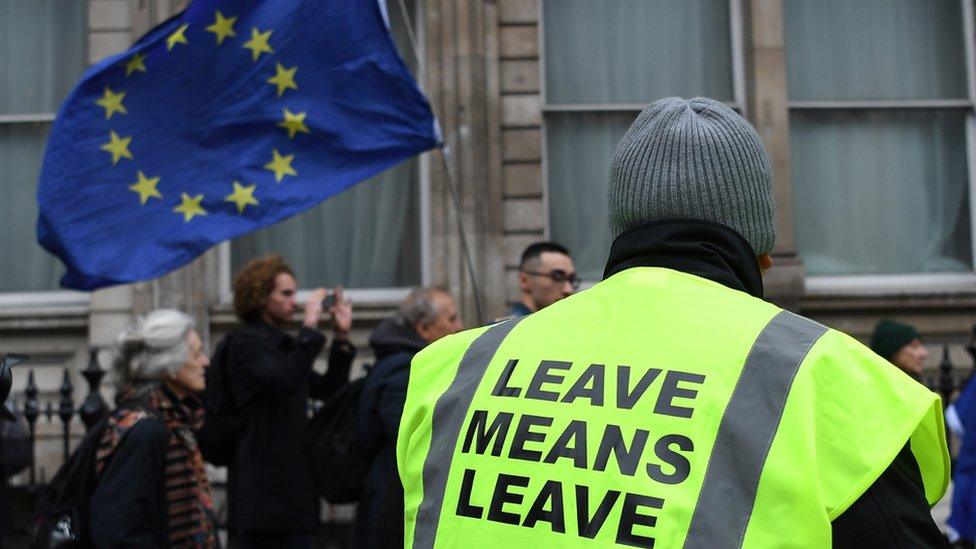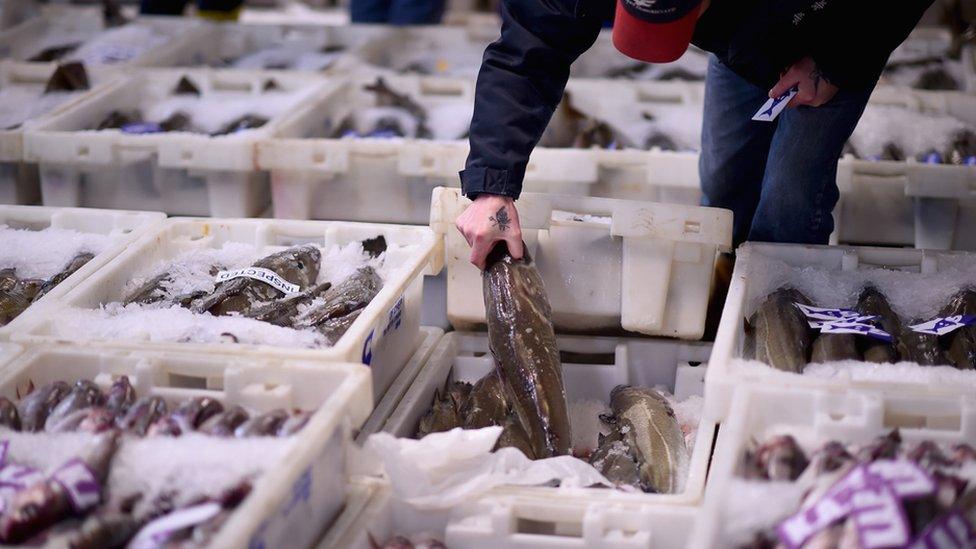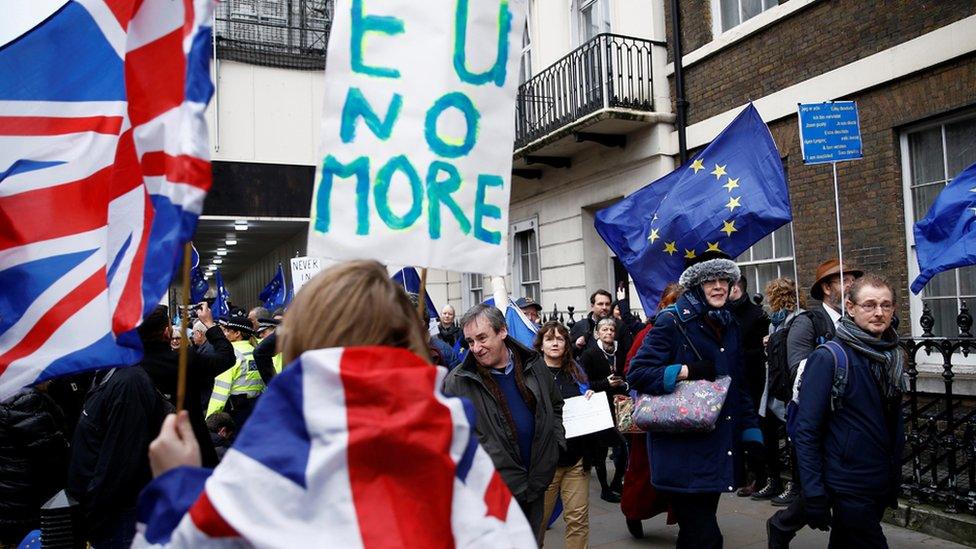Brexit: The difficult bit starts now
- Published

Brexit is far from "done". The difficult bit starts now.
Negotiations with the European Union will be particularly difficult if Britain chooses to maximise its divergence from existing rules.
Other countries have several negotiating advantages over the UK, Meanwhile, many other pressures are crowding in on government.
Why does Brexit happen at 11pm? Simple. It's a concession to European Union standard - it's midnight in Brussels, not in Britain.
It may be the first of many.
That's just one more bit of symbolism, at a junction in history that is heavily signposted with flags and speeches, hope, triumphalism, regret and anger.
But it's just the start. If you think the 11pm Brexit means it's "done", as set out in a highly-effective election slogan, sorry to disappoint. If you think it's done, then you have been. So what comes next?
A new deal with Europe?
However global Britain wants to be, it has to sort out its relationship with the nearest neighbours. The divorce settlement was difficult: the long-term relationship looks more complex.
Britain will be out. There's no point in EU members playing it softly in the hope that Britain might change its mind and remain. Europe has its interests to defend. It has to send a message to other members about the high price to be paid for leaving. It has seen the benefits of being united and it will want to remain so.
Britain needs to get maximum access to EU markets while sticking to the government's intention of moving away from EU rules and regulations, allowing more British flexibility to make its own rules or accept different standards - on farming and manufacturing, for instance - in deals it could do with others.
This much ought to be clear by now. What's not clear is what Britain wants: if it wants to change rules and regulations, how much pushback will the government get. That's not only resistance from EU negotiators, but from the growing army of lobbyists in London.
And the British public: will they want to retain the safeguards on their food introduced by the European Union, and to their employment rights and conditions? Will there be resistance to the introduction of American rules instead?
What about fisheries?

The fishing industry is relatively small but politically significant, especially in Scotland. Expectations have been high that it will "take back control" of British waters.
But it's politically significant also in other European countries. On the EU side of the table, maintaining access to British waters is a high priority, and if it doesn't get what it wants, then Britain will pay a heavy price.
That could mean tariffs on fish being sold into the EU, which is a big British export, or links to other British priorities, such as access to financial service markets in Europe.
And global Britain?
Even without deals, trade continues. We don't stop exporting and importing. But the point of Brexit was, we were told, to ensure the UK could make its own free trade deals. It was less clear what the advantages of that would be, or which trading relationships were being held back by EU membership.
To Brexiteeers, the USA is the big prize in that. President Trump talks big on making deals. But the reality is usually more complex than the president thinks. He'll want it to look good to American voters, as if he's won. So far, his trade manoeuvres have featured bullying, imposition of tariffs and over-claiming for the extent of deals done.
Without any experience of negotiating trade over the past four decades, British officials and negotiators have to fan out around the world, to open talks with other priority trading partners - Japan, China, Australia, New Zealand, Canada, India.
All of them know that Boris Johnson's need for quick victories is much greater than theirs, which puts them in a stronger negotiating position.
Why is so much of this about trade?

There is a broader picture. We talk a lot about trade in goods, such as cars and the complexity of the supply chain. Services represent a much bigger part of the UK economy. That includes finance, business services such as law and accounting, and oil and gas technology. It has been much more difficult to get trade deals in services.
Then, there are the arrangements to be made for European citizens living in Britain, and student exchanges.
There will have to be new arrangements for co-ordinating crime-fighting and security co-operation, data protection; access for trucks and other vehicles from Britain into Europe and the other way round; aviation requires new rules; and there ought to be safeguards for intellectual property, including the protection for Scotch whisky.
Along with that, the UK needs to decide on new domestic arrangements, and to implement them. There will have to be a new immigration policy, including work permits, and the bureaucracy that goes with that. Farm subsidies will either need to be rolled over or changed, and these will be different in Scotland from other parts of the UK.
How well placed is Britain to secure good trade deals?
You can assume that others want trade deals. They want good terms for buying from Britain and selling to it. And even without free trade deals, exporting and importing goes on.
But other countries also want to defend their interests, both in protecting some industries (in Europe, farming is the most protected sector) and in advancing the interests of exporters.
In India, for instance, the priorities for talks with Britain include exports not just of technology services, but work permits for their IT experts.
So Britain has valuable options to put on the table. Other countries have advantages too, starting with time. They don't need the quick results being sought in London, and that puts them at a negotiating advantage.
They have experience of trade negotiations. They have experience of trade negotiations. Even New Zealand has a big lead over Britain on that.
From experience, they've learned that a key part of negotiation is understanding the position of the people on the other side of the table. In more than three years of Brexit negotiations, the British have signalled their weaknesses and chosen to insult foreigners, particularly Europeans. Even if it works well for people back home, that's not a clever negotiating tactic.
How much of this has to be achieved this year?

The deadline for a deal with the European Union has been set at 31 December. If there's no prospect of a deal, they can ask for an extension, but they have to do that by July.
Boris Johnson has said he will not extend. That takes us back into the threat of a no-deal Brexit and brinksmanship.
On an American deal, bear in mind that any negotiations run in parallel with a presidential and congressional election year, and that's unlikely to be helpful.
And remember that other issues press in on government, and the world keeps turning.
As host country for the next major climate change conference, in Glasgow in November, the government should be playing a role in brokering deals, to make it a success.
The NHS may be about to get more cash, but its pressures are more than just financial. They extend to staff shortages, which circle back to Brexit and immigration policy.
There are all those other issues which would normally fill ministerial diaries and in-trays, with rail franchises, HS2, social care reform, and, of course, the unknown unknowns of unexpected international crises or emergencies.
Plus, the unity of the United Kingdom will take time, effort and political capital in Downing Street.
Legislatures or assemblies in Scotland, Wales and Northern Ireland have voted against the Brexit, and the SNP administration at Holyrood is not going to stop asking for a second independence referendum. London was against Brexit, and expectations are being stoked for a big boost in the North of England.
It's going to be busy.
